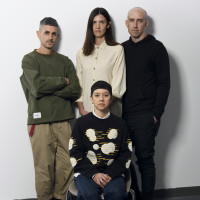
Design | Energy | Futures is a research + design program at the Syracuse University School of Architecture that leads to a Master of Science (MS) in architecture.
At Syracuse, our mission for the MS program is to promote a new generation of environmentally conscious architects who are committed to addressing the challenges of climate change, sustainability, and energy conservation. We believe in the power of design to create sustainable, resilient, and regenerative solutions that mitigate the environmental impact of human activity. We foster a culture of experimentation, where students explore new technologies, materials, and approaches that support the reduction of environmental impact and promote long-term resilience.
Through a curriculum grounded in ecological principles and interdisciplinary collaboration, we empower our students to tackle pressing issues such as climate change, resource depletion, urbanization, and social inequality. We encourage critical thinking, research, and innovation; nurturing a deep understanding of the complex interactions between built and natural environments. We embrace holistic approaches, integrating sustainable design strategies, renewable energy systems, and innovative construction techniques. With a combination of rigorous academic study, hands-on experience, and field research, we aim to equip our graduates with the knowledge, skills, and mindset needed to lead the transformation towards a more sustainable future. Together, we aspire to shape an architecture that not only responds to the challenges of the Anthropocene but also strives to restore and regenerate the planet for generations to come.
Students are directed for the duration of the program by faculty actively engaged in externally sponsored research and design projects with numerous opportunities for research internships in the faculty’s various research facilities.
The curriculum of the MS consists of studios, research seminars, and directed research courses that focus on issues of sustainability and the built environment with research + design projects ranging across many scales and within a range of disciplinary areas among architectural practices. Students may focus on topics, such as, urban design, high performance buildings, computational simulation, innovative material research, among others.
Students must choose a Research Track in either: Prototyping, Building Resilience, Typology, Or Cultural Landscapes, which is most related to their design research interests as it pertains to the Design Energy Futures program (track descriptions below). Students should identify in their application which track they are most interested in and explain why and what you aim to study.
Design Energy Future: Research Tracks
-
PROTOTYPING: Images, Artifacts, and Platforms
Iteratively producing and generating images, artifacts, and platforms affords opportunities to interrogate conventional modes of production, experiment with emerging design technology, test design concepts, and evaluate visual and material effects as it pertains to sustainability, energy efficiency and material processes that influence research and design. -
BUILDING RESILIENCE: Materials, Assemblies, and Systems
Understanding and assessing construction and performance in architecture ensures the design, materialization, and maintenance of spaces and structures that are efficient, sustainable, comfortable, inclusive and resilient as it pertains to research and design. -
TYPOLOGY: Space, Place, and Form
An engagement with the built object and a study of its use, siting, and potential for agency, as measure for architecture’s ability to act as instrument in the making of place through cultural activity, formal expression, and social relationships as it pertains to sustainable design solutions and thoughtful engagement with environmental and ecological constraints. -
CULTURAL LANDSCAPES: Objects and Exchanges in Built and Virtual Environments
A study of the connections, exchanges and relationships between people and the spaces they occupy and the interrelation of politics, form, aesthetics, and advocacy as it pertain to sustainable best practices within different contexts.
Our MS is a STEM Designated Degree by the US Student and Exchange Visitor Program.
Please note: As a research-focused master of science, this program alone does not qualify as a professional degree leading to eligibility for the Architectural Registration Exam or licensure in the USA. More information: www.ncarb.org/get-licensed.











